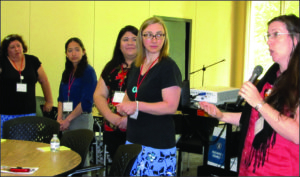
TODAY’S CATHOLIC

SAN ANTONIO • The National Catholic Sisters Project (NCSP) initial curriculum development workshop, cosponsored by the University of the Incarnate Word June 11-13 at Oblate School of Theology, was off to a running start with an opening presentation by Sister Teresa “Tere” Maya, CCVI. Sister Teresa is congregational leader of the Sisters of Charity of the Incarnate Word and president of the Leadership Conference of Women Religious (LCWR).
“I think you are in for a joy ride,” she promised the gathering of education and catechetical professionals from across the country. The NCSP initiative began several years ago, she related, with the goal of raising sisters’ visibility by telling their story. “We need your help,” she said, “in your parishes, in your Catholic schools, wherever you are, because we need to tell the story. And we need to own this story, as a Catholic community in the United States.”
Why talk about nuns in the first place? For Sister Teresa, it began when her 8-year-old niece asked, “Tia, how come there aren’t any more nuns like you? How come they’re all old?” A pivotal moment occurred a few years ago at a high tea in Chile, attended by church hierarchy. She had been translating for her Irish sisters, when a priest said, “Well, Sister, aren’t Catholic nuns in the process of extinction?” This upset her so much she stopped translating and started responding. “No!” she said emphatically. “We are in the process of probably one of the most profound transformations of our history,” noting it wasn’t the first time and wouldn’t be the last.
Realizing this misperception needed to change, she reflected on obvious film images, from The Flying Nun to Dead Man Walking, but these only tell part of the amazing story of women religious. Sisters are owed a debt of gratitude in our country, she said, for their incredible work in education, healthcare, social services and working with the marginalized, and we all need to share in telling their story.
“We need to tell the story simply because we are grateful,” she said, “not because we are going to get anything out of it, not because anything is going to happen.” This was brought home to her during the visitation process that took place in the United States about eight years ago. During this massive assessment of all 475 women’s religious institutions, Vatican representatives visited every institute via a report and some, including the Sisters of Charity of the Incarnate Word (CCVI), by an on-site visit.
“They said they were ‘concerned’,” she related. “I want to believe they were, because I believe we have gotten a lot of fruits from that visitation.” When the process closed in 2014, “nothing of concern” had been found. Sister Teresa was profoundly affected by the visit to her congregation. “Three of the most holy women I have ever met in my life, said to me: ‘Teresa, what have we done wrong?’” she recalled. “All our lives,” they told her, “we have been faithful. We’ve been with the poor. We’ve listened to the changes of Vatican II. Why are they coming?” She felt these sisters had been robbed of the one thing they deserved at the end of their lives — thanks.
What was heartening, however, was the people of God did what the official church did not. Part of the visitation included interviews with lay leaders of the congregation’s ministries, who stepped forward to defend the sisters. “In the middle of all that madness,” she related, “the people of God said: ‘Don’t touch our nuns!’” This was an incredible gift to the sisters, Sister Teresa explained, as was the gift of the church taking notice of the nuns and being reminded of all they have done.
As example, she added that 50 years ago, when Pope John XXIII asked communities to send a third of their members to third world countries, the CCVIs sent sisters throughout Asia, Africa and Latin America to build up the church there. “We need to say, ‘thank you,’ before they are gone,” she said. “They deserve it.”
Another local story was of the Sisters of the Holy Spirit and Mary Immaculate, founded in San Antonio 125 years ago to serve the recently emancipated slaves. Sister Teresa related that when they celebrated this anniversary, African American ministers, politicians and educators came forward to thank the sisters for believing in them despite powerful opposition. “It is an incredible thing what a thank-you will do,” she added.
Another reason nuns need their story told is to reclaim the importance of women in the church. Women have played an important role in Christianity from the very beginning, she noted, “and a great way to tell that story is with nuns.” They have a personal relationship with Jesus, she explained, and have learned the most fundamental part of discipleship, that it is primarily about Jesus, which is what Pope Francis is saying in Evangelii Gaudium, “The Joy of Knowing Jesus.” Nuns might also be called “a little army of resistance” from the very beginning, she related, and church history is filled with names of significant women.
A favorite of Sister Teresa’s is Sor Juana Inés de la Cruz, a nun in 16th century colonial Mexico. A serious scholar and owner of 4,000 books, Sor Juana, got into trouble with a bishop, who felt that women should not be involved in study, but concern themselves solely with kitchen work and prayer. She defended her right to study in a letter which included a voluminous number of names of women of learning in the church from antiquity to her time. “Sor Juana’s is just one story,” said Sister Teresa, pointing out the need to talk about nuns because of their legacy, for the church and for women, of women theologians, spiritual writers, apostolic witnesses, advocates, liturgists, saints and martyrs. “Our history is filled with them,” she observed.
She noted we also need to talk about nuns because they are a key to the future of the church. Their story reminds us that God exists and continues to call us, not just to the religious life, but “to a life worth living.” Sisters are proof, she affirmed, that it is possible to live a life of vocation and response for a lifetime. Here, she spoke of sisters in their 80s and 90s she knew, who continue to visit hospital patients and assist immigrant women and their children being deported. The women call them las abuelas, the grandmothers.
Religious communities each have their own style or gift, she noted, and a gift stays vibrant only if there is a response. First, there is a founding call, to meet a critical human need, and the response to this is a dynamic that continues on. “Religious life is only as vibrant as its response to God’s call in the here and now,” she said. “I would suggest the Christian life is the same way.”
Men and women religious are essential to the future of the church, she added, with more to be said on this in a document that is coming out on the co-evangelical relationship of the hierarchical church and religious institutes. If we do not work to cultivate religious life, she said, we are losing the essence of the church, for it is men and women religious throughout history who called the church back to its true self, as did Francis of Assisi, Catherine of Siena and Oscar Romero.
Finally, we need to talk about nuns, she said, to find the meaning of our baptismal consecration. Living in a time of opioid and suicide epidemics that proclaim life has no meaning, we need sisters’ lives to serve as witness that a lifelong relationship with God is possible and “if you live a life with meaning, then there is joy. Not temporary happiness — joy.” She sees this joy in the faces of sisters celebrating their jubilees.
Sisters tell us why community is important and this is a story we need to share more than ever today. “This false idea that I can make it on my own is not getting us anywhere,” she said, calling it a time for encuentro and finding sacred spaces for conversation with women religious, who can bring hope to people searching for meaning.
Challenging her audience to go on an encuentro with sisters, bringing their students to sisters too old to travel, she recalled the impact of a visit by Sister Rosa Maria Icaza, CCVI, to a graduate theology class she taught and urged taking advantage of the NCSP curriculum as a teacher, catechist or director of religious education.
“These stories have a great treasure,’ she said, “and I think they hold the key to the future of our community as church.”


